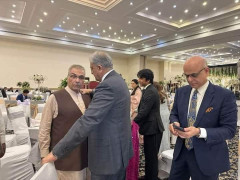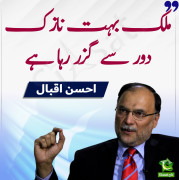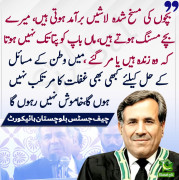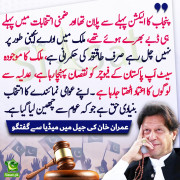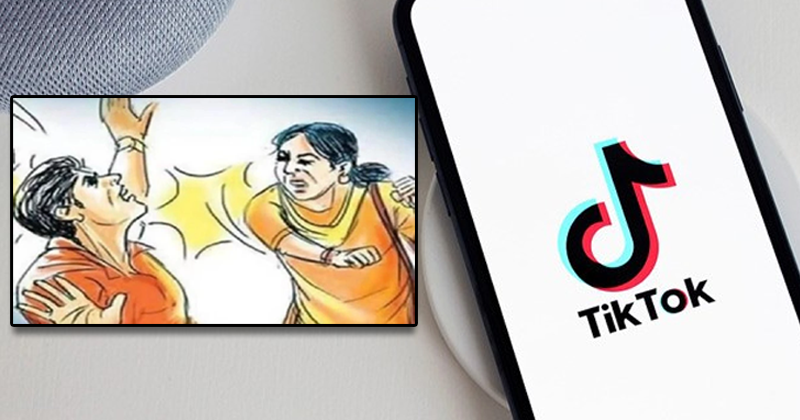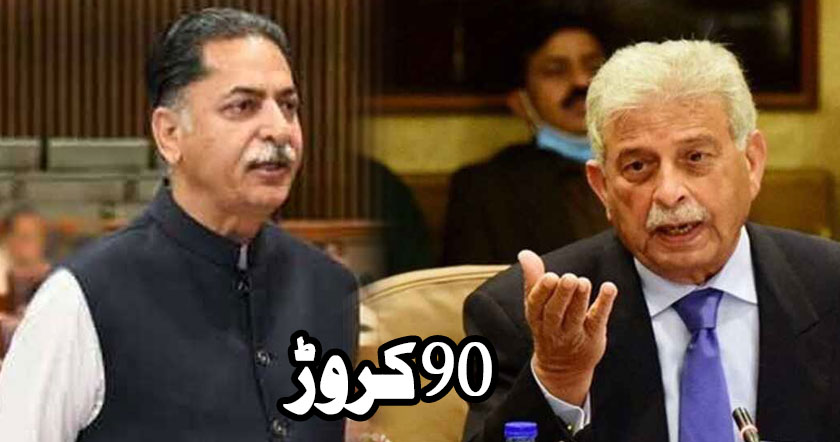By Allama Ghulam Ahmed Pervaiz (in Urdu)
A more detailed analysis by Siraj Islam (in English)

Question: Can you please explain why men in paradise will be rewarded with “beautiful maidens or houris” but the similar or equivalent will not happen for women?
Answer: The concept houris occurs in the Quran as a spiritual metaphor to illustrate heavenly companions with beautiful vision that are equally promised to both men and women. Below I will quote some of my responses to similar questions in the past:
Response 1: Derived from the root Haa-Waw-Ra, the word HOOR (houri) has been traditionally but inappropriately translated as ‘gorgeous women with big eyes’. In fact, the word is the plural of masc. ahwar and femin. haura and signifies a purified companion who has ‘intensely white’ (hauar) ‘inner eyes’ (aaeenin; insights/spiritual visions). Cf. Meaning of white in the Quran. Thus, while hoor is gender-neutral and may equally refer to both male and female counterparts, it is used in the Quran as a spiritual metaphor to illustrate modest and lovely companions/spouses with beautiful vision (deep insight, NOT big eyes). This explains why the companions or disciples of Jesus have been called ‘hawariyyoon’ (same root with hoor; 3:52, 5:111-112, 61:14) who were all males.
Based on the above observations, we can render the hoor-related verses as follows:
Thus shall it be. And We shall pair them with companions having beautiful vision. 44:54 Kathalika wazawwajnahum bihoorin Aaeenin. 44:54
Reclining on thrones lined up, and We shall pair them with companions having beautiful vision. 52:20 Muttaki-eena AAala sururin masfoofatin wazawwajnahum bihoorin Aaeenin. 52:20
Reclining on coaches lined with brocade, fruits of the two gardens are within reach.… / Therein are those of modest gaze (or, best fruits hanging low), never touched by (evils of) humans or invisibles. 55:54, 56; cf. 55:15, 56:23-26.
Therein are fruits, date-palms and pomegranate. … / Companions dwelling in blessed shades (of divine mercy). …/ Never touched by (evils of) humans or invisibles. 55:68, 72, 74 Hoorun maqsooratun feealkhiyami. 55:72
And companions having beautiful vision./ Like pearls well-protected./ A reward for their works./ They will not hear in it any vain talk, nor evil utterances./ Only the utterances of “Peace. Peace.” 56:22-26. Wahoorun Aaeenun. 56:22
Gardens and vineyards./ And blossom equal in age. 78:32-33 Hada-iqa waaAAnaban/ WakawaAAiba atraban. 78:32-33
And when the selfs are paired (?with their deeds/thoughts). 81:7 Wa-itha alnnufoosu zuwwijat. 81:7; cf. (It will be said,) “Assemble the transgressors, together with their spouses (azwajahum) and all they worshiped.” 37:22
It is to be noted that, like the noun zawj (a pair or one of a pair), the verb zawaja (he paired/joined, i.e., one person with another) applies to either of the two sexes. Also, the phrase “And blossom equal in age” in 78:33 above can refer to the gardens and vineyards mentioned in the previous verse, instead of the blooming heavenly maidens with fully grown bosom.
All these verses are in line with the references that insure gardens for virtuous people to be fed therefrom and to dwell therein with their spouses/companions pure (azwajun mutahharatun, 2:25, 4:57).
Response 2: The Quran strongly advocates the unitary origin of humankind from the same life-source, while highlighting the parallel, simultaneous descent of its male and female counterparts (4:1). Thus, far from discriminating against women, it depicts both men and women as contemporary and complimentary to each other, while often mentioning them together in mutual, reciprocal terms as equals (And for women are rights over men similar to those of men over women. 2:226). For example, in addressing the awakened people, the Quran uses the dual expression ‘men and women’ to emphasize the equality of gender with regard to their respective rights, duties, virtues and merits (2:226, 3:195, 9:71, 16:97, 33:35). Also, while assuring both males and females the same recompense for their actions (4:32), it confirms that they both possess the same spiritual capability to enter the eternal garden of bliss if they do good (43:70, 4:124). Nobody is superior to the other, since the superiority of a person is just in the degree of closeness to God through awareness and good actions (49:13).
In keeping with the above, it is important to understand that, in the Quran, houris or ‘pure spouses/companions’ (azwajun mutahharatun, 2:25, 4:57) in heaven are equally promised to both men and women. The related references to these ‘pure spouses’ have been often assumed to be addressing men only because of a fundamentally incorrect traditional association of purity with virginity, thereby attaching it to women. Yet the concept of ‘purity’ in the Quran is solely related to awareness and righteousness and is never used to refer to physical virginity. The popular belief in 72 virgins in paradise is only a hadith-based myth and is not in the Quran. We should focus on doing the best we can here on Earth, while keeping our minds open to the possibility of a better plane of existence called heaven. Why not let it surprise us instead of obsessing about houris.
Response 3: The Quran, besides its universal approach, was a prophetic lecture originally addressed to the Arabic speaking listeners of the 7th century Hijaz – and mainly to the male listeners due to the then patriarchal social reality. Thus the language of the Quran – in order to make its message clear to this direct and primary audience on the first place – was naturally geared towards them, who garnered their perceptions and values regarding a good life from their upbringing in a pre-Islamic environment. This probably explains why the related allegorical narrations of the Quran, on the first sight, seem to be tuned to mirror the paradise, projected by its audience, which consisted of milk and honey, lovely pals and gardens underneath which rivers flow. This is reasonable since, during its revelation, the Quran’s primary focus was probably on conveying its fundamental messages to its local, contemporary listeners in accordance with their understanding, without unnecessarily confronting or confusing them.
I think a reading of the Quran should consider this idiosyncrasy of the Quran. But in no way does it mean that these parables, in their deeper layers, do not have more meanings and wisdoms than what they externally appear. For example, the Quran also describes heaven as a state of nearness to God. Certain Sufis and some Jews believe being near to the Divine is the greatest reward, while being remote from Him equals hell. Which layer of interpretation makes sense to us will depend on where we are in our spiritual journey.
Response 4: This is how we can summarise the verses on heavenly reward: All our actions should be beautiful (16:30, 16:125, 28:54, 41:34); beautiful deeds will be rewarded (6:160, 27:89, 28:84, 39:10, 42:23); everything in the heavenly gardens will be excellent and beautiful (55:70); the righteous ones are destined for a beautiful abode (13:29, 3:14); they will be reclining there on cushions green and carpets beauteous (55:76); they will be coupled with pure companions having beautiful vision (houris, 44:54, 52:20, 55:72, 56:22); they will be served by eternally youthful, handsome boys with “dazzling beauty of scattered pearls” (gelmans; 52:24, 56:17, 76:19); … and so forth. See: The Quran promotes art and aesthetics.
Now, the reality of afterlife and its dimensions – and so the concept houris – can only belong to a domain that is very different from the physical world we live in. It must be absolutely impossible for a human mind to grasp that unknown realm (al-ghayb), which is beyond all the perceptions and definitions of our current existence. It is due to this reason that, though the Quran describes the ‘space’, ‘time’ and ‘events’ of afterlife as real, the descriptions themselves are completely allegorical in nature. In issues like this, the Quran seems to have used allegories in order to express in a figurative manner ‘things’, which, because of their very complexity, cannot be adequately expressed in direct terms or propositions and, therefore, can be also grasped only intuitively, as a general mental image, and not as a series of detailed “statements”. It is like describing various colours of a beautiful rainbow to a person born blind who does not know what it is like to see. The Quran itself calls its ‘descriptions of paradise and hell’ as ‘parables’ (2:24-26,17; 4:10; 7:44-50,176,177,194; 13:35; 17:48,60,89; 32:17-20, 37:61-67; 47:15; 74:31; 76:12-23).
Response 5: Here I will quote this interesting response by Sanmuga Thavamoorthy:
“It might upset the average joker that the word houris actually is also the same meaning for greenery, intelligence and orgasmic satisfaction.
So while the horny are focused on virgins and …
The others can look forward to a paradise filled with neverending stimulation both environmentally and intellectually.
Now, even taking into account a view of the faith based aspect of the interpretation as opposed to our generally academic understanding of the faith’s Book, one simply has to replace the word houri (hourin/enin, etc) with the word idea, and it will all make perfect sense.
As a faith based interpretation of an allegorical guide, one would view the interpretations as a continuance of the Book’s encouragement to use our brains to think, i.e. in the afterlife, there is no physical body hampering our limitations of thought and analysis.
So Paradise would be a place where ideas and thoughts flow freely and in bountiful amounts, ever restarted as fresh new ideas (repeatedly returning to virgin state) upon the consummation of the idea in discourse at a limitless level (which, because it is limitless, can never be really fully consummated, but rather taken on different tangents of ideas.
But does that matter? No, because it is paradise, and ideas flow freely, forever, bountifully.
The soul that is part of the One, is in constant confluence with the thoughts and ideas in process, and therefore in constant bliss of heaven which is the highest reward in itself.
So if one reads the Surahs in the context of ideas and the garden as an environment for the diversity of ideas, what we have is constant triumph of thought provided the shy (respectfully discoursed), new (virgin ideas) and positive (lovely) is the aim of the process.”
A more detailed analysis by Siraj Islam (in English)
The myth of heavenly virgins

Question: Can you please explain why men in paradise will be rewarded with “beautiful maidens or houris” but the similar or equivalent will not happen for women?
Answer: The concept houris occurs in the Quran as a spiritual metaphor to illustrate heavenly companions with beautiful vision that are equally promised to both men and women. Below I will quote some of my responses to similar questions in the past:
Response 1: Derived from the root Haa-Waw-Ra, the word HOOR (houri) has been traditionally but inappropriately translated as ‘gorgeous women with big eyes’. In fact, the word is the plural of masc. ahwar and femin. haura and signifies a purified companion who has ‘intensely white’ (hauar) ‘inner eyes’ (aaeenin; insights/spiritual visions). Cf. Meaning of white in the Quran. Thus, while hoor is gender-neutral and may equally refer to both male and female counterparts, it is used in the Quran as a spiritual metaphor to illustrate modest and lovely companions/spouses with beautiful vision (deep insight, NOT big eyes). This explains why the companions or disciples of Jesus have been called ‘hawariyyoon’ (same root with hoor; 3:52, 5:111-112, 61:14) who were all males.
Based on the above observations, we can render the hoor-related verses as follows:
Thus shall it be. And We shall pair them with companions having beautiful vision. 44:54 Kathalika wazawwajnahum bihoorin Aaeenin. 44:54
Reclining on thrones lined up, and We shall pair them with companions having beautiful vision. 52:20 Muttaki-eena AAala sururin masfoofatin wazawwajnahum bihoorin Aaeenin. 52:20
Reclining on coaches lined with brocade, fruits of the two gardens are within reach.… / Therein are those of modest gaze (or, best fruits hanging low), never touched by (evils of) humans or invisibles. 55:54, 56; cf. 55:15, 56:23-26.
Therein are fruits, date-palms and pomegranate. … / Companions dwelling in blessed shades (of divine mercy). …/ Never touched by (evils of) humans or invisibles. 55:68, 72, 74 Hoorun maqsooratun feealkhiyami. 55:72
And companions having beautiful vision./ Like pearls well-protected./ A reward for their works./ They will not hear in it any vain talk, nor evil utterances./ Only the utterances of “Peace. Peace.” 56:22-26. Wahoorun Aaeenun. 56:22
Gardens and vineyards./ And blossom equal in age. 78:32-33 Hada-iqa waaAAnaban/ WakawaAAiba atraban. 78:32-33
And when the selfs are paired (?with their deeds/thoughts). 81:7 Wa-itha alnnufoosu zuwwijat. 81:7; cf. (It will be said,) “Assemble the transgressors, together with their spouses (azwajahum) and all they worshiped.” 37:22
It is to be noted that, like the noun zawj (a pair or one of a pair), the verb zawaja (he paired/joined, i.e., one person with another) applies to either of the two sexes. Also, the phrase “And blossom equal in age” in 78:33 above can refer to the gardens and vineyards mentioned in the previous verse, instead of the blooming heavenly maidens with fully grown bosom.
All these verses are in line with the references that insure gardens for virtuous people to be fed therefrom and to dwell therein with their spouses/companions pure (azwajun mutahharatun, 2:25, 4:57).
Response 2: The Quran strongly advocates the unitary origin of humankind from the same life-source, while highlighting the parallel, simultaneous descent of its male and female counterparts (4:1). Thus, far from discriminating against women, it depicts both men and women as contemporary and complimentary to each other, while often mentioning them together in mutual, reciprocal terms as equals (And for women are rights over men similar to those of men over women. 2:226). For example, in addressing the awakened people, the Quran uses the dual expression ‘men and women’ to emphasize the equality of gender with regard to their respective rights, duties, virtues and merits (2:226, 3:195, 9:71, 16:97, 33:35). Also, while assuring both males and females the same recompense for their actions (4:32), it confirms that they both possess the same spiritual capability to enter the eternal garden of bliss if they do good (43:70, 4:124). Nobody is superior to the other, since the superiority of a person is just in the degree of closeness to God through awareness and good actions (49:13).
In keeping with the above, it is important to understand that, in the Quran, houris or ‘pure spouses/companions’ (azwajun mutahharatun, 2:25, 4:57) in heaven are equally promised to both men and women. The related references to these ‘pure spouses’ have been often assumed to be addressing men only because of a fundamentally incorrect traditional association of purity with virginity, thereby attaching it to women. Yet the concept of ‘purity’ in the Quran is solely related to awareness and righteousness and is never used to refer to physical virginity. The popular belief in 72 virgins in paradise is only a hadith-based myth and is not in the Quran. We should focus on doing the best we can here on Earth, while keeping our minds open to the possibility of a better plane of existence called heaven. Why not let it surprise us instead of obsessing about houris.
Response 3: The Quran, besides its universal approach, was a prophetic lecture originally addressed to the Arabic speaking listeners of the 7th century Hijaz – and mainly to the male listeners due to the then patriarchal social reality. Thus the language of the Quran – in order to make its message clear to this direct and primary audience on the first place – was naturally geared towards them, who garnered their perceptions and values regarding a good life from their upbringing in a pre-Islamic environment. This probably explains why the related allegorical narrations of the Quran, on the first sight, seem to be tuned to mirror the paradise, projected by its audience, which consisted of milk and honey, lovely pals and gardens underneath which rivers flow. This is reasonable since, during its revelation, the Quran’s primary focus was probably on conveying its fundamental messages to its local, contemporary listeners in accordance with their understanding, without unnecessarily confronting or confusing them.
I think a reading of the Quran should consider this idiosyncrasy of the Quran. But in no way does it mean that these parables, in their deeper layers, do not have more meanings and wisdoms than what they externally appear. For example, the Quran also describes heaven as a state of nearness to God. Certain Sufis and some Jews believe being near to the Divine is the greatest reward, while being remote from Him equals hell. Which layer of interpretation makes sense to us will depend on where we are in our spiritual journey.
Response 4: This is how we can summarise the verses on heavenly reward: All our actions should be beautiful (16:30, 16:125, 28:54, 41:34); beautiful deeds will be rewarded (6:160, 27:89, 28:84, 39:10, 42:23); everything in the heavenly gardens will be excellent and beautiful (55:70); the righteous ones are destined for a beautiful abode (13:29, 3:14); they will be reclining there on cushions green and carpets beauteous (55:76); they will be coupled with pure companions having beautiful vision (houris, 44:54, 52:20, 55:72, 56:22); they will be served by eternally youthful, handsome boys with “dazzling beauty of scattered pearls” (gelmans; 52:24, 56:17, 76:19); … and so forth. See: The Quran promotes art and aesthetics.
Now, the reality of afterlife and its dimensions – and so the concept houris – can only belong to a domain that is very different from the physical world we live in. It must be absolutely impossible for a human mind to grasp that unknown realm (al-ghayb), which is beyond all the perceptions and definitions of our current existence. It is due to this reason that, though the Quran describes the ‘space’, ‘time’ and ‘events’ of afterlife as real, the descriptions themselves are completely allegorical in nature. In issues like this, the Quran seems to have used allegories in order to express in a figurative manner ‘things’, which, because of their very complexity, cannot be adequately expressed in direct terms or propositions and, therefore, can be also grasped only intuitively, as a general mental image, and not as a series of detailed “statements”. It is like describing various colours of a beautiful rainbow to a person born blind who does not know what it is like to see. The Quran itself calls its ‘descriptions of paradise and hell’ as ‘parables’ (2:24-26,17; 4:10; 7:44-50,176,177,194; 13:35; 17:48,60,89; 32:17-20, 37:61-67; 47:15; 74:31; 76:12-23).
Response 5: Here I will quote this interesting response by Sanmuga Thavamoorthy:
“It might upset the average joker that the word houris actually is also the same meaning for greenery, intelligence and orgasmic satisfaction.
So while the horny are focused on virgins and …
The others can look forward to a paradise filled with neverending stimulation both environmentally and intellectually.
Now, even taking into account a view of the faith based aspect of the interpretation as opposed to our generally academic understanding of the faith’s Book, one simply has to replace the word houri (hourin/enin, etc) with the word idea, and it will all make perfect sense.
As a faith based interpretation of an allegorical guide, one would view the interpretations as a continuance of the Book’s encouragement to use our brains to think, i.e. in the afterlife, there is no physical body hampering our limitations of thought and analysis.
So Paradise would be a place where ideas and thoughts flow freely and in bountiful amounts, ever restarted as fresh new ideas (repeatedly returning to virgin state) upon the consummation of the idea in discourse at a limitless level (which, because it is limitless, can never be really fully consummated, but rather taken on different tangents of ideas.
But does that matter? No, because it is paradise, and ideas flow freely, forever, bountifully.
The soul that is part of the One, is in constant confluence with the thoughts and ideas in process, and therefore in constant bliss of heaven which is the highest reward in itself.
So if one reads the Surahs in the context of ideas and the garden as an environment for the diversity of ideas, what we have is constant triumph of thought provided the shy (respectfully discoursed), new (virgin ideas) and positive (lovely) is the aim of the process.”


